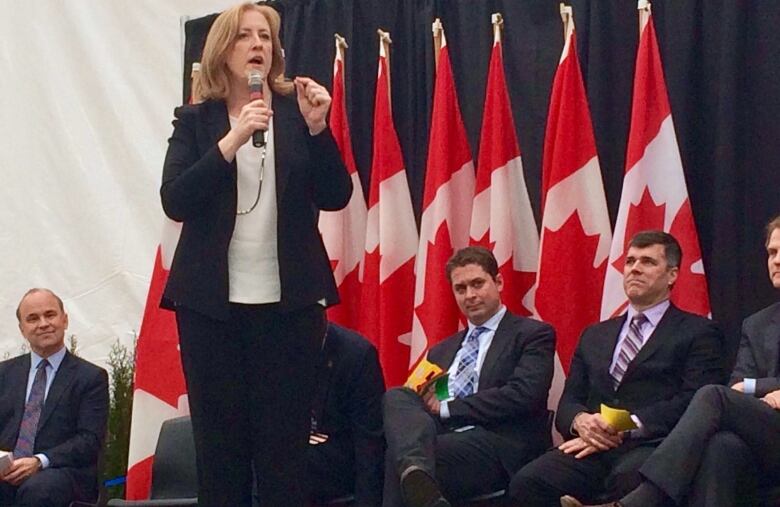Conservative leadership hopefuls draw crowd of 600 to Langley, B.C., debate
Event to be followed by second debate at Vogue Theatre in downtown Vancouver on Sunday

Opposition to safe injection sites, ideas for a two-tiered health care system and Islamophobia, along with jobs and the economy, were alll topics touched on by 12 of 14 of the federal Conservative leadership candidates in the first of two back-to-back B.C. debates.
The Langley debate, hosted by a local nursery, sold out a week in advance and was dubbed, the "Debate in the Valley," by organizers.
It didn't take long for candidates to discuss B.C.'s opioid crisis, which in 2016 claimed 914 lives.
Candidates Brad Trost and Rick Peterson argued about the merits of safe injection sites.
"Safe injection sites, I think they're places that carve out exceptions in the law," said Trost. "I am opposed to them and we need to take legislative action and we need to stop these things from spreading."
Peterson replied to Trost by saying that safe injection sites are not illegal in Canada.
<a href="https://twitter.com/PetersonLeader">@PetersonLeader</a> and <a href="https://twitter.com/BradTrostCPC">@BradTrostCPC</a> argue about safe injection sites at <a href="https://twitter.com/CPC_HQ">@cpc_hq</a> <a href="https://twitter.com/hashtag/debateinthevalley?src=hash">#debateinthevalley</a> <a href="https://twitter.com/hashtag/langley?src=hash">#langley</a> <a href="https://twitter.com/hashtag/likingthese3minutedebates?src=hash">#likingthese3minutedebates</a> <a href="https://t.co/9OMjQRwiF3">pic.twitter.com/9OMjQRwiF3</a>
—@mike_schoutenMeanwhile, North Vancouver's Andrew Saxton talked about how he would push for a two-tiered health-care system in Canada.
"Does the delivery have to be by the government?" he asked in front of a crowd of 600 people.
"We're one of the few countries left in the world that only has one delivery system for health care. Why can't we look at other models — and have private health care delivered by the private sector but paid for by the government?"

Missing from the debate on Saturday was Kevin O'Leary, who took a break from the campaign trail to pitch his name-branded wines on an American home shopping channel.
"We obviously hoped that all the candidates would make it out here," said Glen Arthur, an organizer for the Vancouver debate.
It will take place on Sunday at the Vogue Theatre in downtown Vancouver, although the event is not advertised on the theatre's website.
"[O'Leary] has committed to coming back in and doing an event in the region in the coming weeks, so we'll definitely look forward to seeing that," said Arthur.
Bored of usual <a href="https://twitter.com/hashtag/CPCLdr?src=hash">#CPCLdr</a> debate format? Be the 1st to see <a href="https://twitter.com/CPC_HQ">@CPC_HQ</a> candidates debate 1-on-1 at <a href="https://twitter.com/hashtag/YvrCpcDebate?src=hash">#YvrCpcDebate</a> !<br>Tickets: <a href="https://t.co/A9WcQD6B1n">https://t.co/A9WcQD6B1n</a> <a href="https://t.co/GzHmLRsJ3C">pic.twitter.com/GzHmLRsJ3C</a>
—@VanCentreCPCDeepak Obhrai had scheduled engagements in Quebec and Ottawa on Saturday and is also missing the B.C. events. They are not official party debates, meaning attendance is not mandatory.
Still, O'Leary's absence prompted other candidates to accuse him of not taking the leadership race seriously.
Organizers of Sunday's debate say "candidates will engage in a series of one-on-one debates and smaller group debates."
Kirk LaPointe, a former journalist who ran for mayor in Vancouver in the 2014 municipal election, will be the moderator. He is also a former CBC ombudsman.
On Friday, Maxime Bernier, considered by some to be the race's front-runner, pitched his small government platform to CBC's The Early Edition.
"I want a limited government because in the end I want more freedom and if we have more freedom, we have more prosperity," he said.
Arthur says those buying tickets for Sunday's debate have been filling out a questionnaire about their expectations.
Reaction to anti-Islamophobia motion
He says jobs and the economy are the number one issues, while how the new Conservative leader will work with the new administration in the U.S. is also popular.
Others say they want to know what candidates think of M-103, an anti-Islamophobia motion which has a stated objective of recognizing "the need to quell the increasing public climate of hate and fear."
"We expect to hear some answers from them as to how they would approach those situations," said Arthur.
The Conservative Party leadership election takes place on May 27.
- Conservative leadership candidate Maxime Bernier makes his B.C. pitch
- Conservative leadership contenders spend more time agreeing than debating
- Conservative memberships likely down from 2004 leadership race despite larger field
